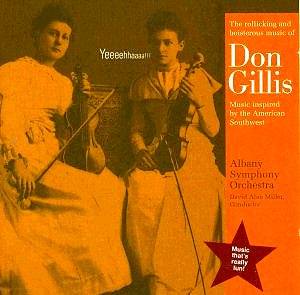Gillis's light classics are presented here as
if in riposte to the English record industry's hectic production
of light British classics. This music is not light in any creaking
or clunking sense. His gift for presenting melody and rhythmically
lively material is well recognised.
Symphony X was Gillis's last symphony
- in fact the twelfth (if you count one for concert band). It
is inspired by various aspects of the life and history of the
city of Dallas. After All American City comes a light and
touching elegy remembering Kennedy’s assassination. It is reminiscent
of Butterworth's Shropshire Lad, of Danny Boy and
of John Williams’ music for Saving Private Ryan. The
Conventioneer third movement is slightly boozy and romantic,
perhaps in evocation, say the notes, of the professional married
man let loose miles from home. Cotton Bowl (the finale)
and All American City are celebratory, circus-brash, stroppy,
opinionated - occasionally reminding one of Gershwin, of Grofé
and even of Malcolm Arnold, as in the United Nations overture.
Shindig is an eight part ballet
lampooning or celebrating the B cowboy movie. All the usual stereotypes
leap through accustomed hoops. There is the burlesque, the bar
piano-player, the rhythm insistently like Shostakovich, some Khachaturyan
with Copland along the way. ‘Black Jake’ certainly gets a look-in
in episode 4 with romantic relief provided by the lissom heroine.
In the last episode the attractive lyrical voice found in the
Requiem for a Hero movement resurfaces.
The Encore Concerto is the second
of Gillis's two piano concertos. It is played here by Alan Feinberg
who keeps it, for the most part, straight but responding to the
blues and cakewalk invitations readily proffered by Gillis and
ending with the a gruff train whistle.
The famed Symphony 5˝ is in four
movements and was premiered by Max Fiedler with the Boston Pops
in May 1947. Perpetual Emotion (the first movement) is
brash with rolling brass, mercurially jazzy woodwind and plenty
of pizzicato and train rhythms. The enigmatically entitled Spiritual?
second movement is part-Balakirev and part ‘big city’ serenade.
Scherzofrenia is a festival in which Mendelssohn’s fairies
meet boozy Damon Runyon-style sidewalk characters. The Conclusion?
movement also sports a question mark in the title. Railroad-Petrushka
rhythms return alongside plantation melodies and intimations
of Broadway. The woodwind strut their wild and woolly stuff.
With the exception of Symphony 5˝ these
are all world premiere recordings.
This is a great addition to the light music library
of any collector with tastes running to Grofé, Carter Pann
or Zez Confrey. Unbuttoned music which not only sends up the various
targets but does so with affection and an ambiguous wink. Well
done Albany.
Rob Barnett
